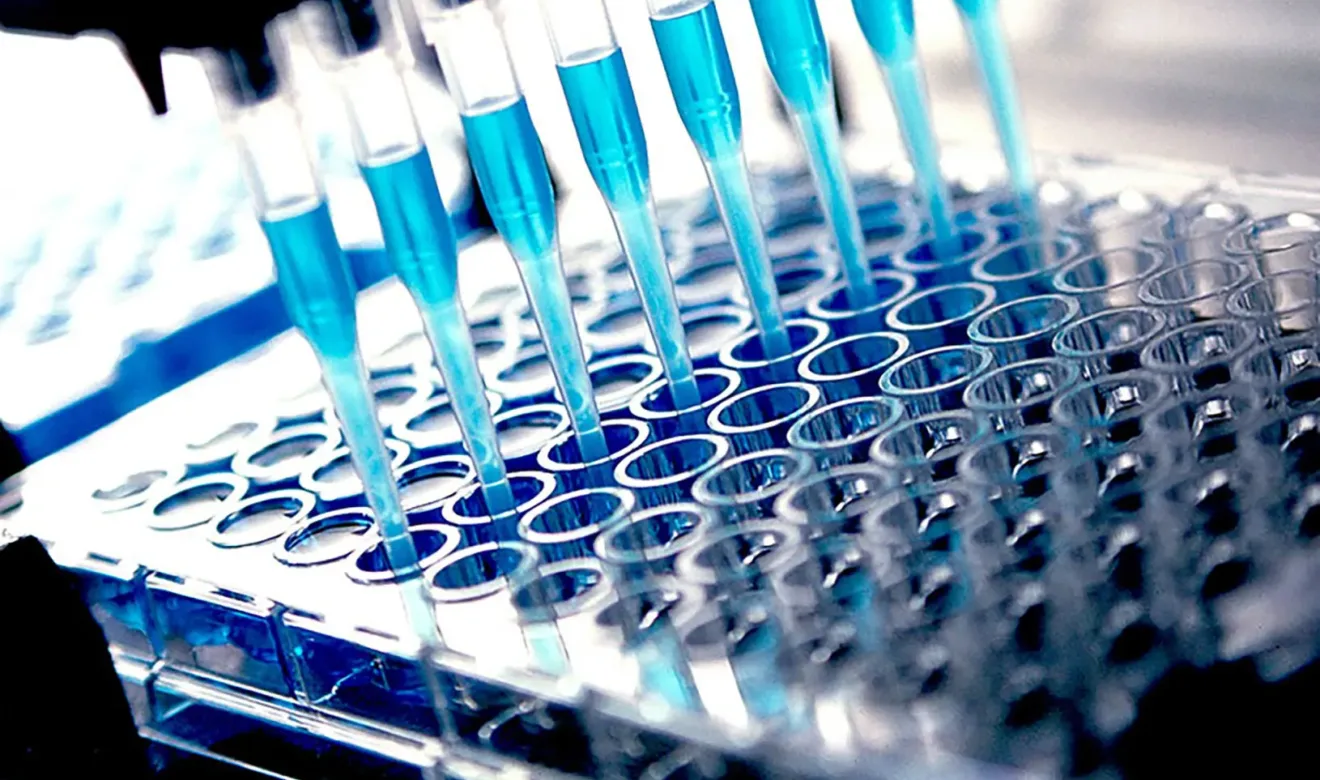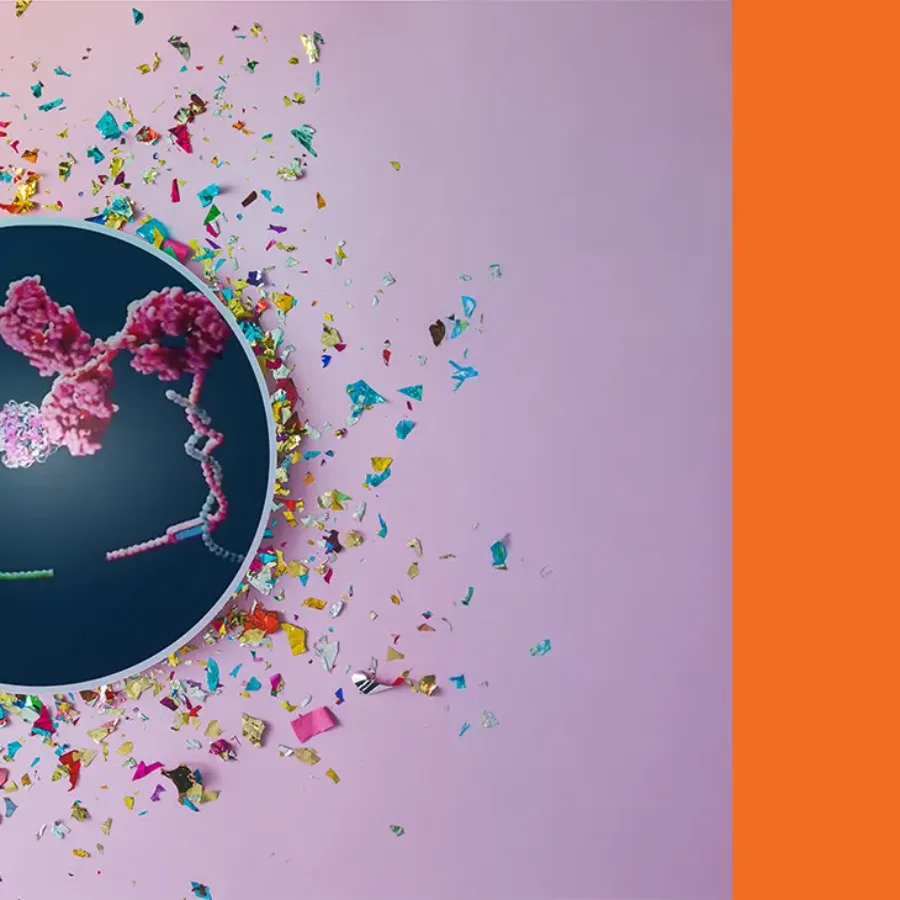
Biomarker Testing Services
We take a scientifically driven approach grounded in the context-of-use of each biomarker. From biomarker assay design to data interpretation, we align our strategies with the mechanism of action of your drug, intended application, and regulatory goals, delivering high-quality data to support confident decision-making across development stages.

Your bioanalytical partner for biomarker assay services
Context-of-Use Driven Strategy
Aligning biomarker strategies with complex therapeutic modalities – including small molecules, antibodies, vaccines, and cell & gene therapies – is critical to avoid costly delays. We provide deep scientific and regulatory insight to tailor biomarker approaches to the final use of the biomarker.
Fit-for-Purpose Assay Development
Generic assays often fall short of specific program needs. Our expert teams design and validate customized assays that deliver the sensitivity and specificity your biomarker program requires.
Smart Technology Selection
Leveraging our broad portfolio of assay platforms, we guide you in selecting the most appropriate technology according to the context of use., ensuring optimal data quality and study efficiency.
Regulatory Confidence
Meeting regulatory expectations is essential for successful submissions. Our GxP-compliant operations align with FDA, EMA, and OECD standards, providing reliable and trustworthy biomarker data.
Proven Therapeutic Expertise
Our extensive experience spans neurology, immunology, oncology, and metabolic diseases. We offer both off-the-shelf panels and customized solutions to meet the unique needs of your biomarker program.
What is biomarker testing?
Biomarker (BMK) analysis is the study of biological indicators, such as proteins, genes, or cell types, that provide valuable insights into disease progression, drug activity, and patient response. They are categorized as soluble, found in biological fluids and measured by assays like LBA, (hybrid) LC/MS-MS — or cellular, identifying specific cells via techniques like flow cytometry, ELISpot or molecular biology techniques.
Biomarker testing impacts drug development by:
- Deepening the understanding of drug and disease biology: Biomarkers provide critical insights into a drug’s mechanism of action and the underlying pathophysiology of the disease.
- Enhancing safety profile: Biomarkers can help detect early signs of toxicity, enabling proactive safety monitoring and optimized dosing strategies.
- Demonstrating target engagement and efficacy: Biomarkers validate that a drug is interacting with its intended target and producing the desired biological effect.
- Enabling patient stratification and diagnostics: Biomarkers help identify patient subgroups most likely to respond, supporting personalized treatment approaches.
- Accelerating development timelines: Biomarker-driven strategies can reduce development risks, enable adaptive trial designs, and speed up decision-making across the pipeline.

Your molecule, our expertise. Let KCAS Bio help with your biomarker analysis project.
Applications of biomarker analysis in drug development
Therapeutic Areas
Oncology | Rare Diseases | Genetic Diseases | Cardiovascular Diseases | Metabolic Diseases : For diagnosis, monitoring, progression, and therapy response.
Neurology & CNS Disorders: Neurobiomarkers in CSF and blood for diseases like Alzheimer’s Disease (AD), Parkinson’s Disease (PD), and Amyotrophic Lateral Sclerosis (ALS).
Inflammatory & Autoimmune Diseases: Cytokines, chemokines, acute-phase proteins, and autoantibodies to assess disease activity and treatment effect.
Infectious Diseases: To track antigen-specific immune responses in chronic and acute viral infections measured by ELISpot, flow cytometry or serology.
Phases of Drug Development
Discovery & Early Development: Biomarkers guide target identification and validation, helping researchers understand disease mechanisms and select promising compounds for further development.
Preclinical Development: During nonclinical studies, biomarkers are essential for assessing pharmacodynamics (PD), and early indicators of efficacy and safety.
Clinical Development: In clinical trials, biomarkers provide insights into how a drug behaves in the body, its efficacy, the engagement of the target, and can help identify patient subgroups most likely to benefit from the investigational new drug (IND) therapy.
Christine Bain, Ph.D. and Magali Roche, Ph.D. from the KCAS Bio, Lyon site in France, share some exciting insights about our labs, scientists, platforms and use-cases for biomarkers and their context-of-use.
“For understanding the context-of-use of the biomarker [the sponsors] want to look at, we have established a questionnaire that we share with them to help us select the right method, the right technology for that.”
Capabilities and assays for biomarker analysis
KCAS Bio uses the most advanced technological platforms to ensure precise, reliable biomarker data. Whether your program requires cellular or soluble biomarker analysis, we select the right approach based on context-of-use and offer both off-the-shelf and customized assays to meet your specific requirements.
Ligand Binding Assays (LBA)
We use ligand binding assays (LBA) for sensitive, specific quantification of biomarkers in complex biological samples.
Mass Spectrometry (LC-MS/MS)
Using hybrid LC-MS/MS, we accurately quantify low-abundance biomarkers and distinguish isoforms or modified variants with high specificity.
Flow Cytometry
Flow cytometry analyzes individual cells to identify and quantify cellular biomarkers, enabling detailed immune profiling.
Molecular techniques
Molecular techniques like qPCR and ddPCR analyze genetic and transcriptomic biomarkers, offering key insights into disease mechanisms and drug development.
ELISpot assay
We use ELISpot to detect and quantify immune biomarkers at the single-cell level with high sensitivity.
Technology and instrumentation for biomarkers analysis
We offer one of the most comprehensive technology platforms for biomarker testing, spanning LBA, flow cytometry, hybrid LC-MS/MS, molecular services, and ELISpot.
We have advanced technology to move your science forward. Speak with a KCAS Bio expert now.
Why work with KCAS Bio?
Full-Service Bioanalysis
End-to-end method development, validation, and reporting under one roof.
Regulatory Expertise
Deep familiarity with FDA, and EMA requirements.
Cutting-Edge Technology
Best-in-class high-sensitivity LBA platforms, triple quadrupole LC-MS/MS and high-resolution MS systems, advanced spectral flow cytometry platforms, and the latest qPCR/ddPCR equipment.
Flexible, Customized Workflows
Tailored workflows to meet unique project goals and timelines.
Broad Sample Type and Matrix Expertise
Plasma, serum, urine, CSF, and tissues plus unstable/rare matrices.
Global Presence with Harmonized Quality
Consistent technical standards and harmonized operations worldwide.
FAQs
Looking for expert insight? Here are some of the top biomarker-related questions our sponsors ask us.
Do you offer off-the-shelf biomarker assays?
Yes, we offer off-the-shelf biomarker assays. These can be a practical and cost-effective choice when they fit the specific context of use for your study. While they provide a strong starting point, we always ensure they are verified for your sample matrix and study objectives to deliver reliable and meaningful results.
Which guidelines should be followed for biomarker validation?
Biomarker validation should follow guidelines such as the ICH M10 Bioanalytical Method Validation guideline, FDA and EMA bioanalytical validation guidelines, and the FDA-NIH BEST (Biomarkers, EndpointS, and other Tools) resource. While ICH M10 primarily focuses on pharmacokinetic assays, its principles can also guide biomarker assay validation, alongside ensuring alignment with the specific context of use and any additional regulatory or scientific recommendations relevant to your program.
How do soluble & cellular biomarkers differ, what methods are used for each?
Soluble biomarkers are measured in fluids like plasma or CSF using platforms such as LBA platforms, LC-MS/MS, or qPCR/ddPCR. Cellular biomarkers are measured in whole blood or tissues using flow cytometry, or ELISpot. Soluble biomarkers focus on quantifying proteins or nucleic acids, while cellular biomarkers assess cell populations and functions, often requiring more complex handling and standardization.
What factors should I consider when selecting a platform for biomarker analysis?
When selecting a platform, consider:
Nature of the biomarker – Whether it is soluble (e.g., cytokines, proteins, nucleic acids) or cellular (e.g., immune cell subsets, functional cell assays).
Need to differentiate isoforms or post-translational modifications – Some assays require precise discrimination between protein variants or modified forms.
Sensitivity and dynamic range – Ensure the platform can detect biomarker levels within the expected concentration range, from low to high abundance.
Multiplexing needs – Determine if simultaneous measurement of multiple analytes is needed to conserve sample and increase data depth.
Sample volume availability – Choose platforms that require minimal sample volume if working with limited matrices.
Sample matrix – Match the platform to the sample type, whether plasma, serum, CSF, urine, whole blood, PBMCs, or tissue, to ensure optimal performance and data quality.
Additional resources
 Blogs
Blogs
Remember that childhood excitement the night before Christmas? Too excited to sleep, knowing something you wished for was finally within reach? That’s exactly the spirit fueling our teams in Lyon as we approach the end of June. We’re eagerly awaiting the arrival of a powerful new platform at our…
 Blogs
Blogs
Biomarkers (BMKs) have become fundamental tools in drug development, accelerating and optimizing targeted therapeutic innovation. As a bioanalytical CRO with over 15 years of experience in biomarker analysis, we’ve seen firsthand how the strategic integration of biomarkers can accelerate drug programs, help meet evolving regulatory standards,…
 Blogs
Blogs
In biomarker-driven drug development, selecting the right assay format is critical for generating reliable data that informs scientific and clinical decisions. Whether quantifying proteins, immune cell subsets, or complex molecular signatures, the choice between off-the-shelf and customized assays has direct implications for timelines, costs, and how well the assay performance…

Tell us how we can help with your project
We've earned our reputation for delivering reliable, error-free data. We understand the importance of speed, flexibility, and consistency and only make promises we can keep.